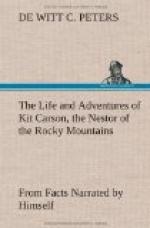In the latter part of the summer, Kit Carson departed from the agency, on a visit to the band of Utahs, one of the tribes who were placed under his special charge. Although, usually, he went to their country several times in a year, yet, more frequently, these Indians came to him in order that they might enjoy the hospitality of his house, and receive from him presents of tobacco and other little commodities which he was always sure to give them—articles which he generally had to pay for himself. In visiting them at their home on this particular occasion, Kit Carson had the double object in view of notifying them of the moon when they must meet the superintendent of the Indian affairs of the territory at Abiquiu, a town adjacent to their hunting-grounds, and one which they often frequented, and also, to inform himself of the schemes which they had on foot and their actual wants, so that he could report to the proper authorities the necessary articles of which they stood most in need. To define the actual wants and requirements of Indians, is a subject which has puzzled many a person who has endeavored thoroughly to investigate their character, and who has understood their mode of life. If the question was left to themselves, it would be readily settled; for, they desire to possess everything which in the least pleases their active fancy; and, so extensive are their demands in this respect, that they know no limit, provided their own inclinations are consulted. By some, it is supposed that the presents of blankets and trinkets which they annually receive from government, are more than sufficient rewards for depriving them of parts of their country. Others there are who charitably add to these things, presents of weapons and ammunition, arguing that thus they can kill their game, and gain their own subsistence without resorting to plunder; but alas! this latter argument is not found, in the majority of instances, to be the peaceful manner in which they employ these gifts. Very often the weapons which they have but recently received, are turned upon their donors with a view of destroying them. The reasoning of the Indian in regard to these presents is perhaps right and just, yet it is by no means pleasing to the exposed frontiersman. The Indian argues that these gifts are but rights which he is forced to receive in lieu of his hunting grounds, with which he is very loath to part, no matter what be the terms or consideration offered. The inference which he draws is, that he can use these presents as he pleases. Money, in the hands of wild Indians, is almost worthless to them, and paying it for their lands by way of annuity, is extreme folly. Some of them in time, as they have become half civilized, begin to appreciate the value of money. Such only, should be allowed to receive or accept it. They sometimes desire it by way of ornament. Then by the usual means of exchanging property, they know how, easily, to obtain it. Every tribe has its own peculiarities in respect to its wants, and the best judge of these is the agent, who should be first chosen for his honor, integrity and skill, and then allowed a large discretion in his decisions.




